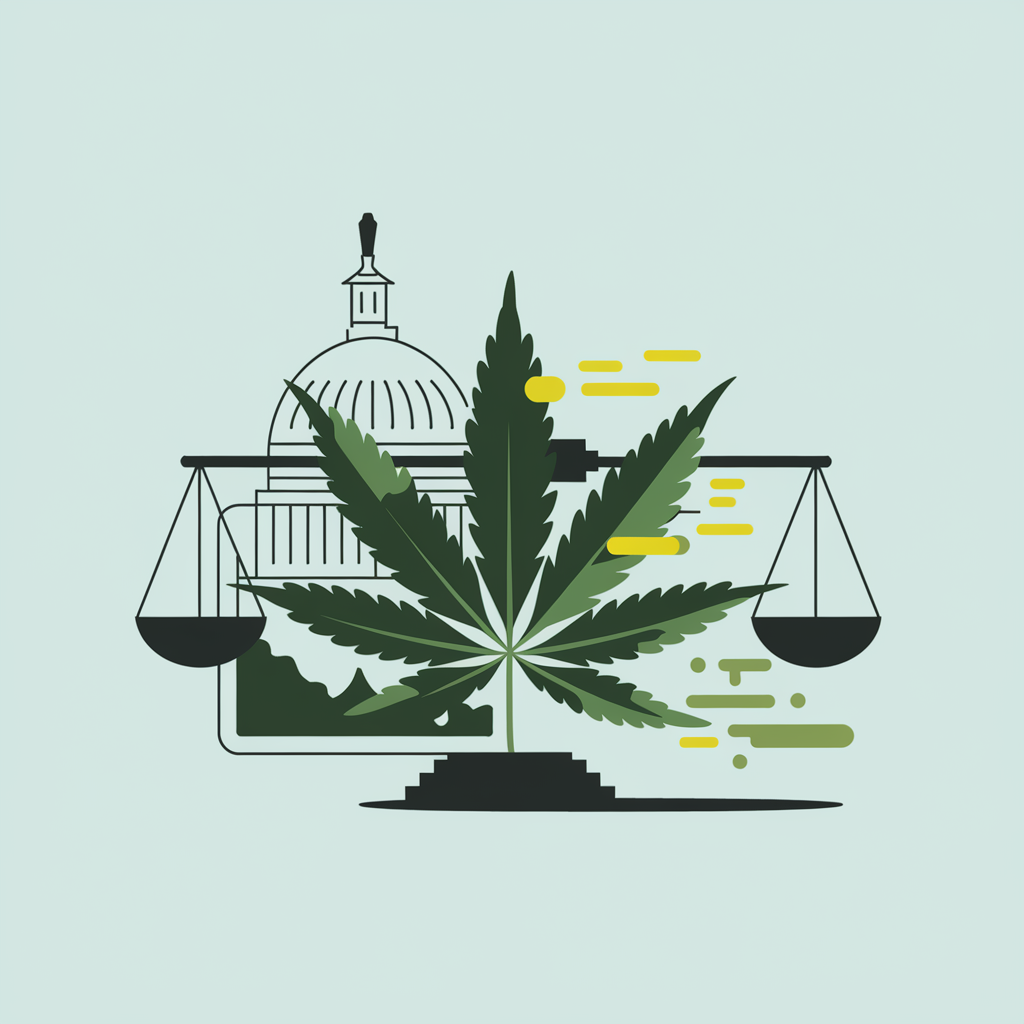Federal marijuana policy faces uncertainty post-inauguration, influenced by key appointments, rescheduling debates, and evolving enforcement priorities.
Efforts to legalize marijuana in the United States have spanned decades, evolving from grassroots advocacy in the 1970s to a growing number of states embracing medical and recreational use in recent years. However, at the federal level, marijuana remains classified as a Schedule I substance under the Controlled Substances Act, placing it alongside heroin and LSD.
This designation asserts that marijuana has a high potential for abuse and no accepted medical use, a stance increasingly at odds with state laws and public opinion.
While 23 states and Washington, D.C., have legalized recreational marijuana, and 38 states allow medical use, federal law continues to create legal and financial hurdles for the cannabis industry. The tension between federal prohibition and state-level legalization underscores the complex political landscape surrounding marijuana policy.
During his presidency, Donald Trump’s stance on marijuana rescheduling was ambiguous, vacillating between deferring to states’ rights and supporting stricter enforcement. His administration’s approach to cannabis policy reflected this ambivalence, with mixed signals from federal agencies.
Recent developments, including discussions around potential rescheduling and limited enforcement under the Biden administration, have reignited debates about marijuana’s future in federal policy. However, with new appointees such as Pam Bondi and Jack Riley potentially leading pivotal agencies, the trajectory of these efforts remains uncertain.
Pam Bondi, nominated for U.S. Attorney General, has a well-documented history of opposing marijuana legalization during her tenure as Florida Attorney General. Meanwhile, Jack Riley, a strong contender for DEA Administrator, has expressed conflicting views on cannabis, recognizing its medical potential while cautioning against broader legalization.
Together, these figures will significantly influence the federal marijuana policy landscape.
Pam Bondi’s Stance on Marijuana
As Florida Attorney General, Pam Bondi opposed medical marijuana legalization, often citing public health and safety concerns.
Her office challenged ballot measures and worked to restrict access to medical marijuana, framing it as a gateway to broader drug use. Bondi’s actions, including lawsuits and public campaigns, positioned her as a staunch opponent of cannabis reform.
Bondi’s confirmation hearing revealed little deviation from her historical stance. While she acknowledged state autonomy in some respects, her responses hinted at a continuation of restrictive policies. Comparisons to predecessors like Jeff Sessions suggest Bondi’s tenure may reinforce conservative federal enforcement priorities.
Jack Riley’s Stance on Marijuana
Jack Riley has repeatedly emphasized his belief in the long debunked gateway drug theory, which falsely states that marijuana use often precedes harder substance abuse. Critics of this theory highlight its lack of conclusive evidence and its role in perpetuating outdated drug policies. Nevertheless, Riley’s perspective could influence DEA priorities under his leadership.
Despite his concerns about recreational use, Riley has supported rescheduling marijuana to Schedule III, a move that would acknowledge its medical potential and ease restrictions on research. This nuanced stance positions Riley as a potential ally for rescheduling efforts, though it remains to be seen how his leadership will balance these priorities.
Rescheduling Process
The Controlled Substances Act categorizes drugs into five schedules based on medical use, abuse potential, and safety. Rescheduling marijuana requires extensive review by the Department of Justice and Health and Human Services, including scientific and medical evaluations.
Despite mounting evidence supporting its medical benefits, efforts to reschedule marijuana have faced significant delays.
Recent discussions within the DOJ and HHS signal growing interest in rescheduling marijuana to Schedule III. However, bureaucratic hurdles and political resistance have slowed progress, leaving advocates frustrated. These delays underscore the challenges of aligning federal policy with evolving public and scientific consensus.
Rescheduling marijuana could have far-reaching implications, including expanded medical research, reduced barriers for the cannabis industry, and changes in federal enforcement. However, critics warn that rescheduling alone may not address broader issues, such as racial disparities and state-federal conflicts.
Federal Enforcement Guidance
Issued in 2013, the Cole Memorandum provided guidance to federal prosecutors, deprioritizing enforcement in states with robust marijuana regulations. This approach fostered industry growth and encouraged state experimentation.
Jeff Sessions’ revocation of the Cole Memorandum in 2018 reintroduced uncertainty, enabling stricter federal enforcement. Under Bondi’s and Riley’s leadership, the future of federal guidance remains uncertain, with potential implications for state-legal markets.
Criminal Justice and Racial Disparities
Racial disparities in drug enforcement have long plagued U.S. policy, with Black and Latino individuals disproportionately arrested and incarcerated for marijuana offenses. Despite similar usage rates, these communities face harsher penalties, reflecting systemic inequities.
Legalization offers an opportunity to address these disparities, reducing arrests and creating pathways for expungement. However, ongoing challenges, including unequal access to industry opportunities, highlight the need for comprehensive reforms.
Public Health and Harm Reduction
Legalization has prompted concerns about public health, including increased emergency room visits and impaired driving. Additionally, the rising potency of THC products has sparked debates about their long-term effects.
Harm reduction measures, such as education campaigns and supervised consumption sites, can mitigate risks associated with marijuana use. Policymakers must balance public safety with the benefits of legalization to create effective strategies.
Navigating the Future of Cannabis Policy
As the federal government grapples with these issues, policymakers must prioritize equity, science-based decision-making, and harm reduction. The path forward will require collaboration among stakeholders to create a cannabis policy that aligns with contemporary realities and public opinion.
Pam Bondi and Jack Riley’s leadership will shape the future of marijuana policy, influencing rescheduling efforts, federal enforcement, and criminal justice reforms. Their stances reflect broader debates about public health, racial equity, and the role of federal oversight in state-legal markets.

***
Trap Culture is the ultimate destination for cannabis enthusiasts who want to experience the best of Arizona’s cannabis culture. Whether you are looking for the hottest cannabis-friendly events, the latest news on cannabis legalization, trends in the industry and exclusive, limited-edition products from the top brands in the market, Trap Culture has you covered. Visit our website to learn more about our events, our blog, and our store. Follow us on social media to stay updated on the latest news and promotions. Join the Trap Culture family and experience the most immersive and engaging social cannabis events in Arizona.
Follow us on social media




